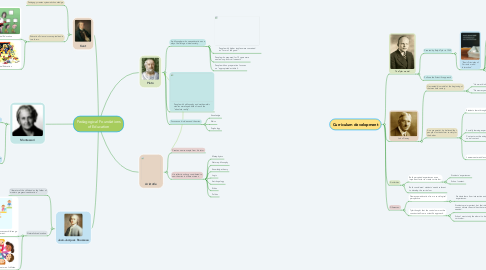
1. Kant
1.1. Pedagogy creates systematic knowledge.
1.2. Education Science is conceptualised in two forms.
1.2.1. Physical Education
1.2.1.1. Mechanic learning
1.2.1.2. Passive learning
1.2.1.3. Ruled by force governs
1.2.2. Practical Education
1.2.2.1. Free and reflective
1.2.2.2. Ruled by society's rules
1.2.2.3. Moral forces
2. Montessori
2.1. She analized how children learn.
2.1.1. Children need an adapted enviroment.
2.1.2. Abundant material is required.
2.1.3. Teachers must be a guide.
2.1.3.1. Supporting
2.1.3.2. Sensitive
2.1.3.3. Respectful
2.2. Children need to learn manners and hygiene.
3. Jean-Jacques Rousseau
3.1. "liberator of the child and as the father of modern progressive education"
3.2. Naturalistic education.
3.2.1. Based on the natural processes children go through in their development.
3.2.1.1. Observation
3.2.1.2. Experimentation
3.2.1.3. Interaction with their physical world.
3.2.2. Understand the nature of children.
3.2.2.1. Interests
3.2.2.2. Particularities
3.2.2.3. Sesations.
4. Plato
4.1. A philosopher who sees education as a way of building an ideal society.
4.1.1. People with higher studies were conceived as "form of the good".
4.1.2. People who prepared for 15 years were named "superior civil servants".
4.1.3. People with no preparation focuses on "appropiated activities".
4.2. People with philosophy and mathemathic studies were capabable of reach the "absolute reality".
4.3. Focuses on his ideas and theories.
4.3.1. Knowledge
4.3.2. Ethics
4.3.3. Psychology
5. Aristotle
5.1. Creates new concepts from his tutor.
5.2. His reflections have contributed to new theories in different areas.
5.2.1. Metaphysics
5.2.2. Nature philosophy
5.2.3. Knowledge theory
5.2.4. Logic
5.2.5. Antrhopology
5.2.6. Ethics
5.2.7. Politics
6. Curriculum development
6.1. The Tyler model
6.1.1. Created by Ralph Tyler in 1940
6.1.1.1. "Basic Principles of Curriculum and Instruction"
6.1.1.1.1. Determine the school’s purposes.
6.1.1.1.2. Identify educational experiences.
6.1.1.1.3. Organize the experiences
6.1.1.1.4. Evaluate the purposes
6.1.2. Follows the Scientific approach
6.2. John Dewey
6.2.1. He created his model at the beginning of the twentieth century.
6.2.1.1. "How we think" 1910.
6.2.1.2. "Democracy and education" 1966.
6.2.2. As a pragmatist, he believed that people must transform society for the better.
6.2.2.1. Students learn through social interaction.
6.2.2.1.1. Classrooms are perceived as social institutions.
6.2.2.2. Socially learning experiences.
6.2.2.3. Content must be adapted to children's social context.
6.2.2.4. Learner-centered classrooms.
6.2.2.4.1. Students are seen as unique individuals
6.3. Similarities
6.3.1. Both perceived experiences as an important factor to create curriculum.
6.3.1.1. Students' experiences.
6.3.1.2. School context.
6.3.2. Both considered students' needs relevant to develop the curriculum.
6.4. Diferences.
6.4.1. Dewey saw education from a sociological perspective.
6.4.1.1. Students learn from interaction and experiences.
6.4.2. Tyler thought that the curriculum must be constructed from a scientific approach.
6.4.2.1. Students are important, but their desires cannot dictate the activities that are needed.
6.4.2.2. School must study the alumni to build the curriculum.
